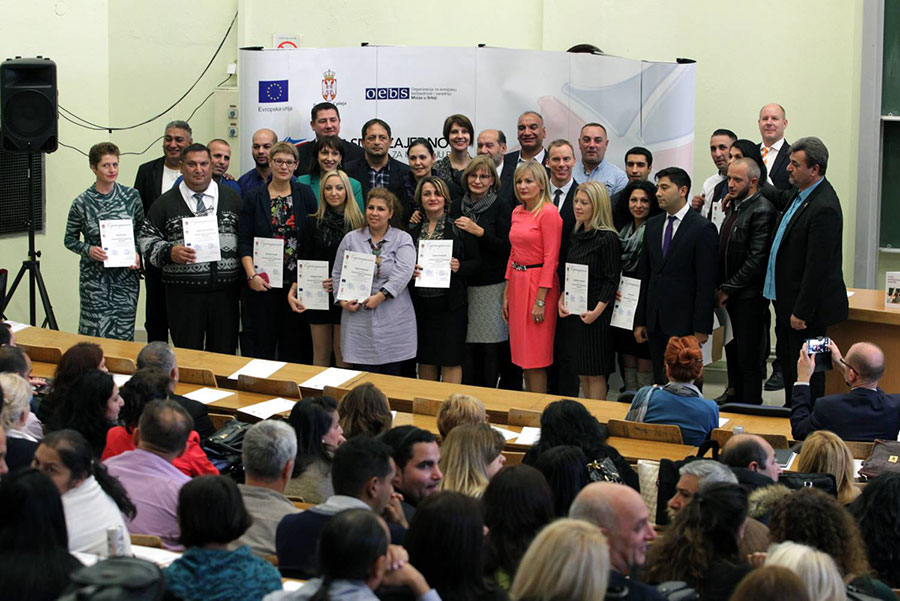191 pedagogical assistants who have undergone professional training programme aimed at preventing early school dropout and improving school performance among Roma pupils have received diplomas on 20 October in Kragujevac.
Director of the Government’s Office for Human and Minority Rights Suzana Paunovic says that pedagogical assistants, working at elementary and secondary schools, are doing an important job by helping children from socially vulnerable groups and Roma children and making sure they receive continuous and quality education. According to her, thanks to the work done by first mobile teams for Roma inclusion and full support of pedagogical assistants, in just one year over 1 300 Roma children have been enrolled in preschools.
“The training programme equipped us with necessary knowledge in areas such as psychology, methodology, child safety, and taught us to to apply the best methods in working with pupils, their families and our colleagues,“ said Milorad Jovanovic, Pedagogical Assistant at the elementary school Milan Rakic in Mionica. He added that through the programme of professional training, the assistants were given a chance to make part of education system by representing Roma population and thus eradicate prejudice.
Angelina Skarep Independent Advisor at the Ministry of Education, Science and Technological Development thanked the EU, the OSCE Mission in Serbia, the University of Kragujevac, the Faculty of Pedagogical Sciences in Jagodina and the Office for Human and Minority Rights as partners who had taken part in the implementation of this programme. “This is a unique example of the support for social inclusion in the region – through the development of pedagogical assistants whose primary job is to support the Roma community. We have completed one phase of the work which will allow pedagogical assistants to fully integrate in education system.” Apart from engaging a large number of children in education system, this approach monitors their progress while increasing the trust of Roma community in education system.
“Most importantly, the training we have underwent contributed to achieving a higher quality of work with children,” said Aleksandar Asanovic, Pedagogical Assistant at Radoje Domanovic elementary in Nis.
The network of pedagogical assistants should expand and form a part of the systemic support provided by the Ministry as a straightforward example of quality education for all. The systemic professional training of assistants has been supported by the European Union and Sweden. The final four modules (a precondition for the systematisation of the position and its integration in education system) have been carried out within the project “We are here together – European support for Roma inclusion”.
The project “We are here together – European support for Roma inclusion“, worth EUR4.8 million, is funded by the European Union and implemented by the OSCE Mission in Serbia, in coordination with the Office for Human and Minority Rights. As of June 2013, the project has supported the implementation of the National strategy for improvement of the status of Roma in the Republic of Serbia in certain areas such as access to fundamental rights, civic participation, education, health and social protection, adequate housing and creation of new jobs.




